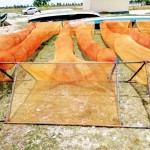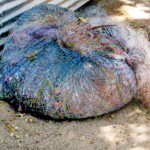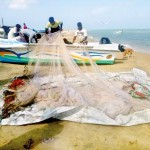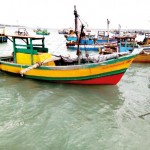Sunday Times 2
Turning the tide on unsustainable fishing
There is a widely held belief that because Sri Lanka’s exclusive economic zone (EEZ = 517,000 km2) is eight times the island’s land area (65,610 km2), the seas around Sri Lanka are full of fish. Unfortunately this is simply not true.
Coastal fisheries surpassed the estimated annual maximum sustainable yield (MSY) for coastal fish production in 2012 (MSY = 242,000 MT). According to Fisheries and Aquatic Resources Ministry data, the catch from coastal fisheries has remained at or above MSY for the past seven years. The estimated MSY was calculated in 1980 by the Norwegian research vessel MS Fridtjoff Hansen. A survey by the same research vessel in 2019 suggested that the total biomass of all coastal fish stocks was only 170,000 Mt. If this finding is true, then the present MSY from coastal fisheries is much less than it was forty years ago and very much less than the catch reported in 2018.
The status of fish stocks within Sri Lanka’s EEZ and beyond is no better. Skipjack (balaya), yellowfin tuna (kelavala), sailfish (thalapath), swordfish (sappara )and marlins (koppara) harvested by Sri Lanka’s large fleet of offshore and high-seas multi-day fishing boats are all highly migratory species. Sri Lanka shares these stocks with all of the other countries fringing the Indian Ocean, as well as with the distant water European Union fishing nations, such as Spain, France and Italy.
In 2018 the Indian Ocean Tuna Commission (IOTC) called upon member states, including Sri Lanka, to reduce their annual catch of yellowfin tuna by 5 percent to 15 percent. This call was made in response to growing concerns about the status of the Indian Ocean yellowfin tuna stock. In 2018, IOTC scientists reported that the yellowfin tuna was ‘overfished’ and subject to ‘overfishing’. In 2019 the Blue Marine Foundation, a UK-based environmental organisation, called for a 25 percent reduction in the catch of yellowfin tuna by all beyond EEZ fisheries. This year the Global Tuna Alliance, a US-based environmental organisation, also called for a 25 percent reduction in the catch of yellowfin tuna from all yellowfin tuna fisheries. Even the waters beyond Sri Lanka’s EEZ are not teeming with fish.
The current status and future prospects for Sri Lanka’s coastal, EEZ and beyond EEZ fisheries represents a formidable challenge for the recently re-appointed fisheries minister, Douglas Devananda. The Presidents’ vision for Sri Lanka’s fisheries includes introducing a fisheries development plan to provide nutrition to people; increase foreign exchange earnings from seafood; provide employment and livelihood opportunities and to safeguard coastal areas and the marine environment.
More or bigger boats, anchorages and harbours with better facilities and improved harvest and post-technology are obviously not going to solve the problem of overfished stocks and unsustainable levels of fishing, within and beyond Sri Lanka’s jurisdiction. So what then can the new Government do to deliver the President’s vision for sustainable ocean resource management?
Fish are natural, renewable resources. Left to themselves, fish grow and reproduce, grow and reproduce and will eventually re-fill the seas around Sri Lanka and the oceans beyond. Sustainable fisheries means finding a balance between the natural potential of fish (stocks) to increase and the natural desire of fishermen to decrease fish by harvesting as many fish as possible.
A key first step towards delivering sustainable Sri Lankan fisheries is to eliminate illegal and destructive fishing practices. Illegal fishing by Tamil Nadu trawlers in Sri Lankan waters deprives Sri Lankan fishermen of US$ 40 million (LKR 6 billion) every year. Another US$ 40 million is lost by Sri Lanka’s seafood export industry, which is unable to process Sri Lanka’s fish when the catch is landed by trawlers in Tamil Nadu. Illegal trawl net fishing by Sri Lankan fishermen depletes coastal fisheries and degrades coastal marine habitats.
Other forms of indiscriminate fishing such as ring nets (laila and sirukku) in coastal waters, micro-mesh box nets and monofilament nets in estuaries and lagoons and dynamite fishing anywhere deplete coastal fish stocks and/or degrade or destroy marine habitats upon which the entire marine ecosystem depends.
Resuming the arrest of Tamil Nadu trawlers after it has been hindered by the COVID-19 pandemic; enforcement of the 2017 regulation that prohibits trawl-net fishing in Sri Lankan waters and better management of indiscriminate fishing methods under a new fisheries development plan will make significant contributions towards providing nutrition to people and increasing Sri Lankan seafood export earnings.
Improving the collaborative management of coastal fisheries — by the department with fishermen — under a new fisheries development plan will also guarantee employment and livelihood opportunities for coastal communities and safeguard coastal areas and the marine environment.
Sri Lanka’s South Asian neighbours — India, Bangladesh, the Maldives and Pakistan — – have a shared interest in delivering improvements to the management and status of highly migratory stocks. The development of a SAARC-level fisheries management proposal for the recovery and sustainable exploitation of skipjack, yellowfin tuna, sailfish, swordfish and marlins will require a collaborative effort by the ministries of fisheries and foreign affairs.
In so doing the new Government would not only drive Sri Lanka’s fisheries policy and development planning firmly in the direction of the Presidents’ vision for sustainable ocean resource management, but also enable Sri Lanka to achieve the United Nations’ Sustainable Development Goal 14 – the conservation and sustainable use of oceans, seas and marine resources for sustainable development.
(Steve Creech is a freelance fisheries consultant and director of Pelagikos Pvt Ltd. Email: steve@pelagikos.lk)
Crimes at sea: Tamil Nadu fishermen’s trawlers, boats and illegal trawl nets





